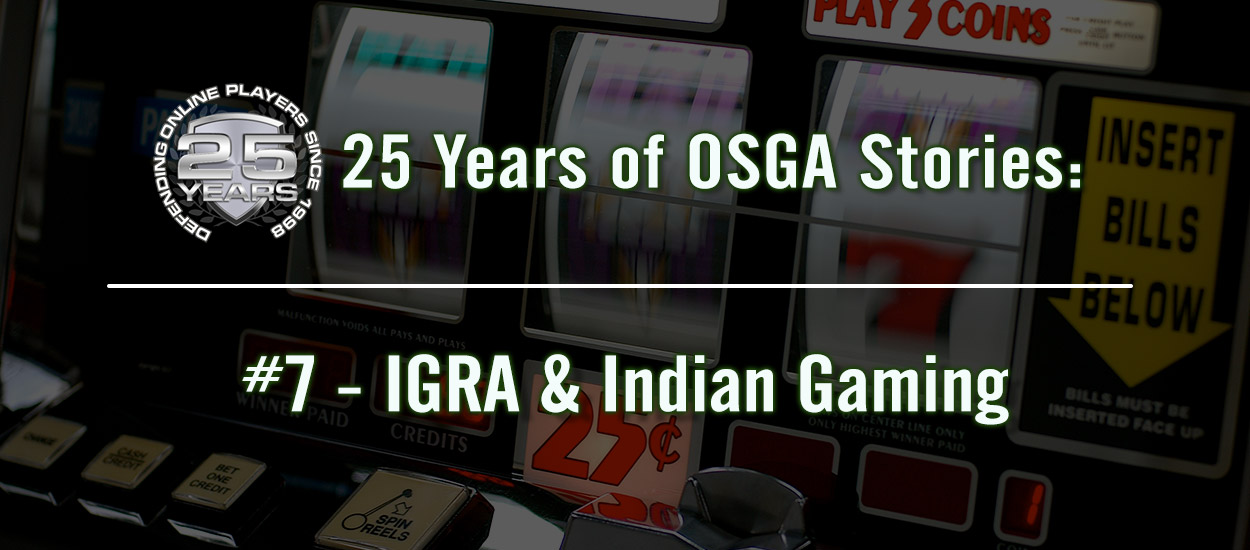Tribal gaming has been contentious at times, making it a big story in gambling over the past 25 years
One of the more interesting developments in the last 25 years has been the growth of Tribal Gaming in the United States after the introduction of the Indian Gaming Regulatory Act (IGRA). The IGRA was passed into federal law in 1988 after the Supreme Court ruled in California v. Cabazon Band of Mission Indians, that federal and tribal interests in Indian gaming prevented states from enacting state law on Tribal lands. In better words, Tribes had sovereignty in creating their own laws for social activities provided those activities weren’t specifically illegal under state constitutions (example being Utah where gambling of any sort is strictly prohibited by the state constitution). The goal of the IGRA was to provide some federal regulatory framework which would allow Tribes to have a gambling economy even in states where casinos didn’t already exist. The IGRA led to the creation of the National Indian Gaming Commission (NIGC), which is currently the regulators for Indian gaming.
The Indian Gaming Regulatory Act
The IGRA identifies three levels of gambling. Class I gambling includes social and charitable gambling, which is completely legal for Tribes to conduct and falls outside the scope of any IGRA regulations. Class II gambling includes bingo, pull tabs and other instant-type lottery ticket games as well as non-banked card games, i.e., games where players play against each other and the house has no vested interest. These games are legal under the IGRA provided they are not prohibited in the state constitution, and rules for Class II gambling are regulated by the NIGC. Class III gambling represents all other forms of gambling, including slot machines, banked card games, roulette, craps, etc. The NIGC indicated that in their view any games where the house takes a cut, even if it is just rake in poker then it is Class III. Under the rules of Class III gambling, the Tribes must reach a compact with the state and be approved by the Secretary of the Interior. They are required to put regulations in place such as age restrictions and compulsive gambling minimization measures that are approved by both the state government and the NIGC. As part of the compact, the Tribes generally agree to pay a percentage of their winnings to the state which has become a contentious issue which will be discussed later. The IGRA also stipulates that all bets must take place exclusively on Indian lands which is described as:
(a) Land within the limits of an Indian reservation; or
(b) Land over which an Indian tribe exercises governmental power and that is either -
(1) Held in trust by the United States for the benefit of any Indian tribe or individual; or
(2) Held by an Indian tribe or individual subject to restriction by the United States against alienation.
This requirement has been the subject of controversy as well to be discussed in this article.
As of today, there are 31 states that offer Tribal gambling. In some of the states the Tribes are given exclusive rights to offer Class III gambling, some states only allow commercial gambling and some states offer both commercial and Indian gaming. It’s in these states that most of the issues and complaints surrounding the IGRA have been launched, especially when there are multiple Tribes involved. The NIGC have indicated that there are currently 360 Indian gaming establishments in the United States involving 220 different Tribes. The Tribal gambling industry is now also worth about $18 billion, which is up substantially from 1988 when Tribal gambling accounted for only about 100 million dollars, mostly via Class I and Class II gambling.
Ongoing Controversy
While Tribal gambling has been profitable for both states and the Tribes, it hasn’t gone without controversy. In states like Connecticut and Washington, Tribal compacts are working without a hitch and both the states and Tribes have benefitted greatly. Mohegan Sun and Foxwoods are examples of casinos that have benefitted the economies of both the state and the tribal nations. The biggest sticking point with Native American gaming has been when states decided to allow commercial casinos to compete against Tribal casinos when Tribal casinos were previously the only game in town for Class III gambling. A prime example of this since OSGA started operations occurred in the state of New York.
New York dispute
Until the turn of the century, the only legal gambling in New York was on horse racing and lotteries. In 2002, however, the Seneca Tribe reached a compact with Albany to allow the Tribe exclusive rights to Class III gambling in Western New York (described as west of Route 14 located just east of the Finger Lakes to Buffalo) in exchange for giving the state a percentage of the winnings. In 2002 the Seneca tribe built a casino and hotel in Niagara Falls, NY near the falls on native lands, in 2003 they built a casino in Salamanca in Allegheny County on native lands, and in 2004 they built a casino in Buffalo on Buffalo Creek territory, which is also listed as Tribal lands. 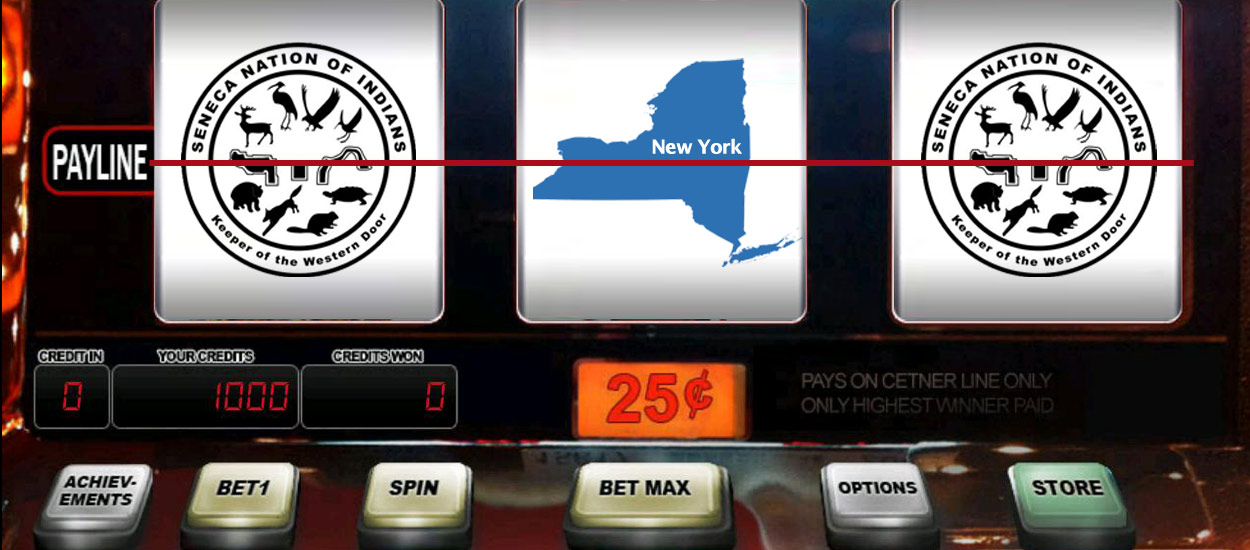 The compact was for 14 years but would extend for seven years, unless contested. The Senecas paid the fees to the state until 2016 when the compact was set to renew, but then announced that in their view the state violated the terms of the compact by allowing video lottery terminals and slot machines to be introduced at racetracks in the exclusivity zone, namely at Batavia Downs, Buffalo Raceway and Finger Lakes Racetrack. The Senecas said that because New York violated their exclusivity terms, they weren’t required to pay the state anything further.
The compact was for 14 years but would extend for seven years, unless contested. The Senecas paid the fees to the state until 2016 when the compact was set to renew, but then announced that in their view the state violated the terms of the compact by allowing video lottery terminals and slot machines to be introduced at racetracks in the exclusivity zone, namely at Batavia Downs, Buffalo Raceway and Finger Lakes Racetrack. The Senecas said that because New York violated their exclusivity terms, they weren’t required to pay the state anything further.
The state sued the Seneca Tribe and won, but the Tribe refused to abide by the court rule. In turn, in 2021 the state froze the assets of the Seneca Tribe saying it owed the state $545 million and the Tribe argued that the state was holding them for ransom and denying the funds which were used to ensure Tribal sovereignty. The Tribe sued the state again at a higher level but dropped the suit in 2022. With the compact set to end, they realized by continuing to pursue this, the state likely would not renew the compact and the Seneca Tribe would lose everything, as the state would likely put up commercial casinos in Western New York. The two sides came to a new 20 year compact in June 2023 and the Senecas started paying the state what was owed to them.
Michigan dispute
Another example of where the IGRA became an issue was in Michigan. In 2013 the small Native American Tribe called Bay Mills Indian Community, located just south of Sault Ste. Marie, was given a compact with the state to offer a Class III casino on their land, but then purchased a property in Vanderbilt, located about 125 miles south of their actual reservation and far closer to more populated areas of Michigan, where they opened a casino. The state sued Bay Mills saying they can’t simply buy a property elsewhere, declare it Indian lands and set up a casino, as that was in violation of the IGRA, but Bay Mills said as a sovereign entity they had the right to do so. The courts sided with the Bay Mills Indian Community thus showing that Tribal sovereignty was paramount when it came to gambling disputes.
A far greater issue occurred about five years later when Michigan legalized online casino and sports betting in 2019. Bay Mills along with five other Tribes that had compacts with the state realized that they would be shut out of any real profits from online gambling since their reserves are so remote. Thus, the only real benefactors would be the three commercial casinos in Detroit, particularly MGM. The IGRA also technically disallowed Tribes from offering online gambling that would reach anywhere beyond Indian lands. 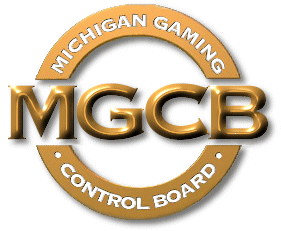 Not wanting to create an unfair situation the Michigan Gaming Control Board came up with a solution that allowed the Tribes to compete with the commercial casinos.
Not wanting to create an unfair situation the Michigan Gaming Control Board came up with a solution that allowed the Tribes to compete with the commercial casinos.
The board decided that since online gambling fell outside of the rules of the IGRA, the Tribes were to be treated like commercial gambling companies for online gambling and thus required to pay the same taxes, licensing fees and follow the same regulatory requirements that places like MGM and GreekTown Casino were required to do. The Tribes realized that trying to set up their own websites was unfeasible, so they agreed to partnerships with online gambling companies including DraftKings, FanDuel, Caesars, BetRivers and Wynn. The Hannahville Indian Community partnered with TwinSpires, but then changed to 888 after TwinSpires announced it would only be focusing on horse racing. For their part, the two other commercial casinos also partnered with sports betting experts as Greektown partnered with Penn Gaming (formerly Barstool Sports, but soon to be ESPNBet) and MotorCity Casino partnered with FanDuel. MGM of course used their own BetMGM brand. The arrangement has worked out well as online gambling and sports betting has exploded in the state and both the Tribes and commercial companies are doing well.
Arizona
The other state that had to shift midstream was Arizona. Under a 2003 compact all gambling was limited to the 22 Tribes located in that state and games were limited to slot machines, bingo and banked card games. However, when sports betting was legalized in the state, the Arizona sports teams and commercial gambling operators, like DraftKings, asked to be given a shot to operate commercially. A deal was brokered between the Tribes, the leagues, and the commercial operators whereby all companies could compete for licenses, plus the Tribes were allowed to include other forms of gambling at their physical casinos, including roulette, craps and other previously prohibited games. Moreover, the Tribes were permitted to build new casinos. Since the deal, betting has been lower than expected in the state and 95% of sports bets have been made at DraftKings, FanDuel, BetMGM and Caesars. More concerning to the Tribes is that traffic to land-based casinos hasn’t increased, thus causing Tribes to be concerned they are getting left behind. It is notable that much of the loss of foot traffic was due to restrictions for the pandemic and the Tribes hope to see a large rebound soon.
No Path in California
Two states, however, that have dominated the news with respect to Indian Gaming are California and Florida.
The issue in California has centered on poker. Poker has been a major gambling product in California for decades, ever since the expansion west. So, along with private games, poker clubs and poker rooms at Tribal casinos have been popular. 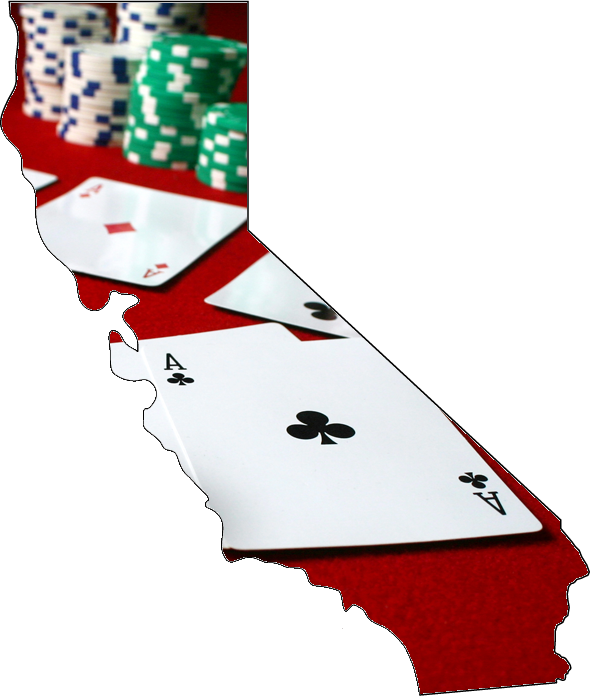 State legislators have tried to create an iPoker market since 2008, believing it would build state coffers through taxes. But every effort has been met with opposition from racetracks, poker rooms, Tribes and lobbyists who felt they would not get their fair share. Anti-gambling groups (including Tribes that oppose gambling) also expressed their opposition to iPoker. By 2014, however it appeared that the opposition would finally end as 13 of the 14 Tribal groups with casinos agreed to a poker bill, plus the horse racing industry, which wanted in on the action, agreed to drop their opposition, provided they were given some of the profits. But the Tribes and poker rooms also set up partnerships with existing poker sites in anticipation of legal internet poker, and one of the Tribes, the Morongo Band of Mission Indians set up a partnership with PokerStars, at the time owned by the Rational Group. PokerStars also set up a partnership with the three largest poker rooms, the Bicycle Casino, the Commerce Club and Hawaiian Gardens. One of the stipulations of the agreement was that there would be a bad actor clause which would disqualify any company that continued operating in the United States after the passage of the UIGEA in 2006 (despite the fact the UIGEA didn’t prohibit internet poker). The bill also stipulated that if the ownership changed, the company would still be blacklisted. The bill was clearly intended to disqualify PokerStars and in effect nullify the agreements with the Morongo Tribe and the three poker rooms, since the other Tribes realized that most action would be with PokerStars. This bad actor clause remains a sticking point almost a decade later, since The Morongo Band of Mission Indians refuse to sign any bill with that clause and the bill requires unanimous consent of the Tribes to pass.
State legislators have tried to create an iPoker market since 2008, believing it would build state coffers through taxes. But every effort has been met with opposition from racetracks, poker rooms, Tribes and lobbyists who felt they would not get their fair share. Anti-gambling groups (including Tribes that oppose gambling) also expressed their opposition to iPoker. By 2014, however it appeared that the opposition would finally end as 13 of the 14 Tribal groups with casinos agreed to a poker bill, plus the horse racing industry, which wanted in on the action, agreed to drop their opposition, provided they were given some of the profits. But the Tribes and poker rooms also set up partnerships with existing poker sites in anticipation of legal internet poker, and one of the Tribes, the Morongo Band of Mission Indians set up a partnership with PokerStars, at the time owned by the Rational Group. PokerStars also set up a partnership with the three largest poker rooms, the Bicycle Casino, the Commerce Club and Hawaiian Gardens. One of the stipulations of the agreement was that there would be a bad actor clause which would disqualify any company that continued operating in the United States after the passage of the UIGEA in 2006 (despite the fact the UIGEA didn’t prohibit internet poker). The bill also stipulated that if the ownership changed, the company would still be blacklisted. The bill was clearly intended to disqualify PokerStars and in effect nullify the agreements with the Morongo Tribe and the three poker rooms, since the other Tribes realized that most action would be with PokerStars. This bad actor clause remains a sticking point almost a decade later, since The Morongo Band of Mission Indians refuse to sign any bill with that clause and the bill requires unanimous consent of the Tribes to pass.
In the meantime, sports betting has been legalized in the U.S., but California is at a standstill with that as well, since Tribes want exclusivity to sports betting and many legislators want an open market. The decision was left to the voters and two bills were tabled in the 2022 midterm elections. Proposition 26 was going to allow retail sports betting at Tribal casinos only and proposition 27 would allow major online sportsbooks to offer sports betting online and would ban retail sports betting. The two bills could technically pass which would create a hybrid approach to sports betting. Naturally the Tribes were in favor of prop 26 and opposed to prop 27, while sites like DraftKings wanted prop 27 to pass regardless of whether California voters approved prop 26 also. Both propositions proposed a 10% tax rate. When the votes were tallied, both propositions were denied, prop 26 by a 3 to 2 margin and prop 27 by a 5 to 1 margin. So, while the rest of the country moves on and increases state coffers with new revenue sources, California remains an outlier with no foreseeable path for any gambling expansion due to Tribal disagreements and voter discontent towards gambling.
The Seminole Tribe and Florida
Of all the states where Tribal gambling has been in the news, Florida is perhaps the most contentious. In 2010 Governor Charlie Crist signed a compact with the Seminole Tribe that gave them exclusive rights to offer slots and non-banked card games at the five casinos outside of Miami-Dade and Broward County, since commercial casinos operate there. The compact expired in 2015 and new Governor Rick Scott signed a 7-year compact giving The Seminoles the same deal, but included the right to offer craps, roulette and banked card games, like blackjack, at the Seminole casinos in exchange for $3 billion a year. The deal was somewhat contentious since many legislators said the Seminoles were breaking the original agreement by offering banked card games disguised as non-banked card games already at the Tampa casino. Nevertheless, the compact was accepted as is. But when sports betting became legalized in 2017, there was a push to allow sports betting from other operations besides the Seminoles. 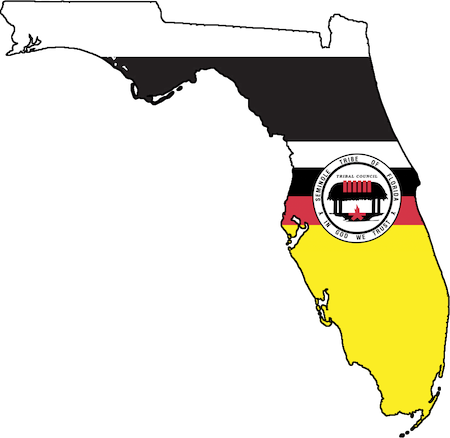 In 2021 Governor Ron DeSantis signed a 30-year compact with the Seminoles extending the terms of the previous contract, while also giving them exclusive rights to offer sports betting in exchange for at least $2.5 billion a year for the first five years. The compact also gave the Seminoles the right to offer sports betting at all their casinos and to work with pari-mutuel companies to offer sports betting at their facilities. West Palm Beach Kennel Club, Ocala Gainesville Poker, Hialeah Park Casino, and Tampa Bay Downs signed an agreement with the Seminoles. The Seminoles were also allowed to offer sports betting online via the Hard Rock app (Seminoles bought Hard Rock in Florida years ago).
In 2021 Governor Ron DeSantis signed a 30-year compact with the Seminoles extending the terms of the previous contract, while also giving them exclusive rights to offer sports betting in exchange for at least $2.5 billion a year for the first five years. The compact also gave the Seminoles the right to offer sports betting at all their casinos and to work with pari-mutuel companies to offer sports betting at their facilities. West Palm Beach Kennel Club, Ocala Gainesville Poker, Hialeah Park Casino, and Tampa Bay Downs signed an agreement with the Seminoles. The Seminoles were also allowed to offer sports betting online via the Hard Rock app (Seminoles bought Hard Rock in Florida years ago).
Not surprising there was pushback from pari-mutuels that were shut out, along with commercial companies like Draft Kings and FanDuel, who felt it should be an open process. Two companies, Bonita Springs Poker Room and Magic City Casino, sued Deb Haaland, the U.S. Secretary of the Interior, after she approved the compact. The lawsuit said that the IGRA demands all betting take place on Indian lands, but the pari-mutuel operations that partnered with the Seminoles are outside of Seminole lands and internet wagering can take place anywhere in Florida. Thus, the compact violates the IGRA, as all of this betting is not exclusively taking place on Indian lands.
The Seminoles argued that all sports bets would be handled by servers located on Seminole territory and therefore is legal. The Tribe began offering sports betting on the Hard Rock app in September 2021, but were required to stop when a federal judge in November 2021 called the compact “a fiction” and said it violates the IGRA. A federal appeals court overruled that decision in June 2023 saying the compact was legal and in early October SCOTUS put a temporary stay on the appeals court ruling, but later lifted the stay saying the compact was legal. Still, some justices expressed concern that it may not only violate the state’s constitution and the IGRA, but also may go against equal protection laws.
So, it appears that Florida’s compact may be legal, but then again it may not. Once again, the big sticking point is the IGRA. The Hard Rock App has restarted but the ones who sued to have it rescinded have vowed to fight on and the Florida issue is not over by a long shot.
A lot has happened with regards to Tribal gaming in the last 25 years and OSGA has been at the forefront covering the news on all its developments. With the ongoing infighting in California and Florida still wrestling with the legalities, it seems like we will continue to report on Tribal gaming for the foreseeable future.
Read insights from Hartley Henderson every week here at OSGA and check out Hartley's RUMOR MILL!










